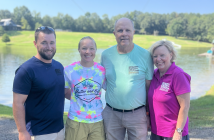The family of a Stowe Mountain Resort, Vt., zip line tour guide who died two years ago on the course is suing the resort and several equipment manufacturers for wrongful death.
Guide Scott Lewis was riding on the resort’s ZipTour on Sept. 23, 2021, when he slammed into the receiving station at a high rate of speed—76 mph, according to a GPS device—and died. The Vermont Occupational Safety and Health Administration investigated the incident and determined that a lanyard had failed during braking, leading to Lewis’s death. Lewis, 53, had been a guide on the Stowe zip tour since it opened in 2015.
The ZipTour is a unique design, in that the trolley has an integrated, user-operated brake. Riders pull down on a handle to disengage the brake as they start their descent, and release the handle to engage the brake. This allows riders to control their speed during their descent on the line and, particularly important in this incident, the speed at which they arrive at the landing platform. Should riders fail to brake sufficiently, the ZipTour has a spring bank backup brake.
Those named in the suit include Vail Resorts (VR), which owns Stowe; zip tour designer Terra-Nova; builder Zip Install; equipment supplier Petzl America; and engineering/inspection firm Precisioneering. Since the companies are based in different states, the case is being heard in U.S. District Court.
The suit claims that VR encouraged employees to race one another at high speeds and chose not to replace the lanyard that investigators have blamed for causing Lewis’s death, contrary to a recommendation by Terra-Nova. It further alleges negligence against Terra-Nova, Zip Install, Petzl America, and Precisioneering.
The lawsuit calls for punitive damages against VR and Precisioneering, arguing that both company’s actions “demonstrate a conscious disregard for the rights and safety of Scott Lewis and other employees and members of the public using the ZipTour zip.”
The companies, in their answers to the complaint, denied all allegations.
In a motion filed to dismiss the case, VR argued that Lewis’s family is only entitled to workers’ compensation, saying “it is undisputed” that Lewis’s death occurred while he was working, and that “work-connected injuries” trigger Vermont’s exclusivity law when it comes to workers’ compensation.
“The Estate’s complaint does not allege facts that would demonstrate Stowe acted with a specific intent to injure Mr. Lewis,” VR further argued.






